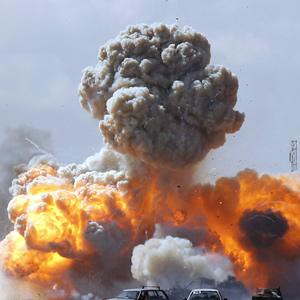
Imperialist warplanes drop bombs on vehicles in the eastern region of Libya. The North American capitalist states and their allies in Europe have launched bombing operations against the North African state of Libya., a photo by Pan-African News Wire File Photos on Flickr.
NATO: No immediate plan to end Libya mission
BRUSSELS (AP) – NATO ministers said Thursday that the bombing campaign in Libya, now in its seventh month, will continue until armed resistance to the new pro-Western regime ceases.
U.S. Defense Secretary Leon Panetta — speaking at a meeting of NATO defense ministers dedicated mainly to Afghanistan and Libya — said a decision to cease bombing will depend on events in the coastal town of Sirte where forces loyal to Moammar Gadhafi remain in control, whether Gadhafi's forces continue to threaten civilians, and whether the former strongman retains a command role.
Panetta said the ministers agreed that the decision to cease operations also would depend on the ability of the anti-Gadhafi forces to confront armed resistance.
French Defense Minister Gerard Longuet also underlined that the airstrikes will not cease until all remaining pockets of resistance are suppressed and the new government asks for them to end.
"Sirte has an extremely symbolic value, but it's not all of Libya," Longuet said as he arrived for the second and final day of the conference. "There is pro-Gadhafi resistance in Bani Walid and dispersed resistance in the south of the country."
Other officials echoed their words, leaving open the possibility that the bombing could be extended for a further 3-month period if pro-Gadhafi forces continue fighting.
NATO has carried out more than 9,300 airstrikes since the campaign started in March. The military alliance has been criticized for allegedly overstepping U.N. Security Council resolution that created a no-fly zone and authorized the protection of civilians caught up in the fighting.
Military commanders have said they believe the military mission is largely complete, and could begin wrapping up soon. But the public message from Panetta and other leaders suggests the campaign could continue for some time, as long as the fighting continues.
NATO said that despite calls for it to intervene in Syria, it has no intention of launching a similar operation there. Almost 3,000 people have been killed in protests against President Bashar Assad's regime in the past six months.
"We took on responsibility in Libya because there was a clear U.N. mandate and because we received clear support from countries in the region," Secretary-General Anders Fogh Rasmussen said. "None of these conditions are fulfilled in regards to Syria, and these conditions are essential."
On Afghanistan, ministers expressed confidence that the plan to gradually turn over responsibility to Afghan army and police remains on track. The 140,000-strong NATO-led force plans to cease combat operations in 2014.
"The Afghan forces are increasingly showing that they are capable of taking on the insurgents," Fogh Rasmussen said.
Afghan Defense Minister Abdul Rahim Wardak said his country's forces plan to take responsibility for security in some of the most dangerous parts of the country soon. He said plans to reintegrate Taliban fighters are going well, noting that most were not "ideologically committed" to the insurgency.
Military officials estimate the number of insurgents at between 20,000 and 25,000 men.
Although outnumbered, the Taliban have mounted a series of high-profile attacks that have brought into question NATO's claim that it has the upper hand in the war and that the bloodshed is decreasing. The United Nations released a report last month saying the monthly level of violence in the country was significantly higher than in 2010.
"The actual security situation is not as bad as it has been portrayed in the media," Wardak said. "What's going on is that the enemy cannot confront our forces, and they are focusing on roadside bombs and these sensational attacks such as the assassination of government figures."
On Wednesday, NATO ministers discussed plans to cooperate more closely and pool their resources in order to make up for the shortfalls that have plagued the alliance's operations in Libya and Afghanistan.
In order to reduce dependence on the U.S., NATO wants to create its own system of air surveillance using U.S.-made Global Hawk unmanned aircraft. Member nations are also planning to beef up the alliance's strategic air transport and aerial refueling capabilities.
But it remains unclear whether these programs can be implemented at a time when defense budgets in Europe and the United States are being slashed as part of public spending cuts and other austerity measures designed to deal with the worsening economic crisis.
1 comment:
Why should they stop? Serial killers never know how to stop.
Post a Comment